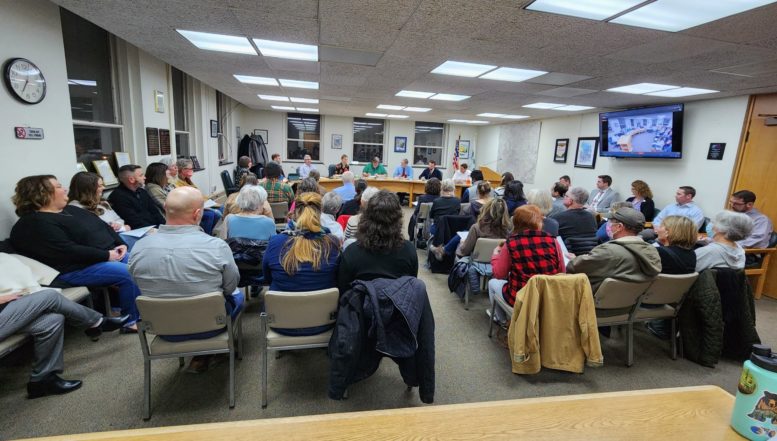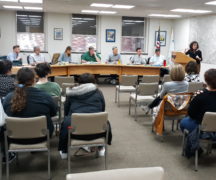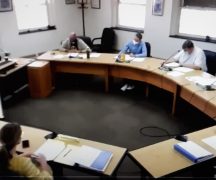By JAN LARSON McLAUGHLIN
BG Independent News
A petition signed by more than 400 Bowling Green residents opposed to the zoning code update was presented to City Council Tuesday evening.
Council chambers was again packed with residents, and speakers were again limited to two minutes a piece.
The residents told City Council the proposed Pedestrian Residential zoning may work in big cities, but it’s not right for Bowling Green. They expressed their distrust that the city will enforce code requirements, and they shared fears that the zoning change will only mean more decline in their older neighborhoods.
David Drain, who lives in a historic home on East Court Street, presented the petition to council and voiced concerns about brochures promoting the Pedestrian Residential zoning, which would allow some small businesses to locate in several blocks of older residential neighborhoods on the east and west sides of Main Street. The brochures promote “new urbanism,” which is geared to larger wealthier cities, Drain said.
Bowling Green is already a walkable community with a vibrant downtown, he stressed.
Kathleen Dennis, of Buttonwood Avenue, said adding more commercial sites will have a negative effect on Bowling Green, which already lacks stable homeownership. With 64% of the homes in the city being rentals, the city should focus on enforcing standards for rental properties, she said.
Suzanne Midden, also of Buttonwood Avenue, said concerned citizens aren’t whining about rentals. She is surrounded on all sides by rental properties, and does not object to the renters – but is troubled by the poor upkeep by owners.
Bowling Green needs to focus on rehabilitating its housing stock to create charming and desirable neighborhoods, she said.
Vassiliki Leontis, of North Summit Street, voiced concerns about the lack of vigorous research on the Pedestrian Residential zoning category. She objected to the “talking points” which are “politically and socially attractive,” but don’t research problems that may occur with the zoning change, such as lack of parking.
Christina Humble Mazzupappa, of South Enterprise Street, spoke up for renters, saying they also deserve decent places to live – but those are difficult to find in Bowling Green. And buying a house is even harder.
“It’s already very difficult to find a home if you want to buy,” she said.
“It almost seems the city only wants rentals,” adding that the goal seems to be adding more rentals without improving the ones that already exist, Humble Mazzupappa said.
She also said the new zoning category does not seem to be about helping businesses – judging from the empty strip mall sites and the poor health of the mall on the north end of the city.
Ross Mazzupappa, a professor at Bowling Green State University, said he rented in the city for seven years.
“I’m pro-rental, anti-red lining, and all for local businesses,” he said.
But the city lacks enforcement and has failed to make sure rentals are safe, he said, noting that rental housing is a frequent topic of discussion with his students. When Bowling Green can prove it cares about rentals and local businesses, then maybe students will want to stay here after they graduate, Mazzupappa said.
Steve Ricard, of West Wooster Street, pointed out that the city’s previous land use plans did not mention Pedestrian Residential zoning. The new zoning category is not the solution to Bowling Green’s problems, he said.
Ricard also said the zoning change ignores local goals, and is not the community’s vision.
Anesa Miller, of North Maple Street, said Bowling Green is already walkable and has viable small businesses – and the new zoning will not help.
Margaret Baker, of Eberly Avenue, said she first attended planning commission meetings about the zoning changes, and was alarmed to hear the consultant talking about “trends.”
“Please don’t go by trends,” Baker said to City Council.
Fern Kao, of Buttonwood Avenue, said she was “dismayed” that the city’s zoning consultant was from Chicago, which has different needs than Bowling Green.





